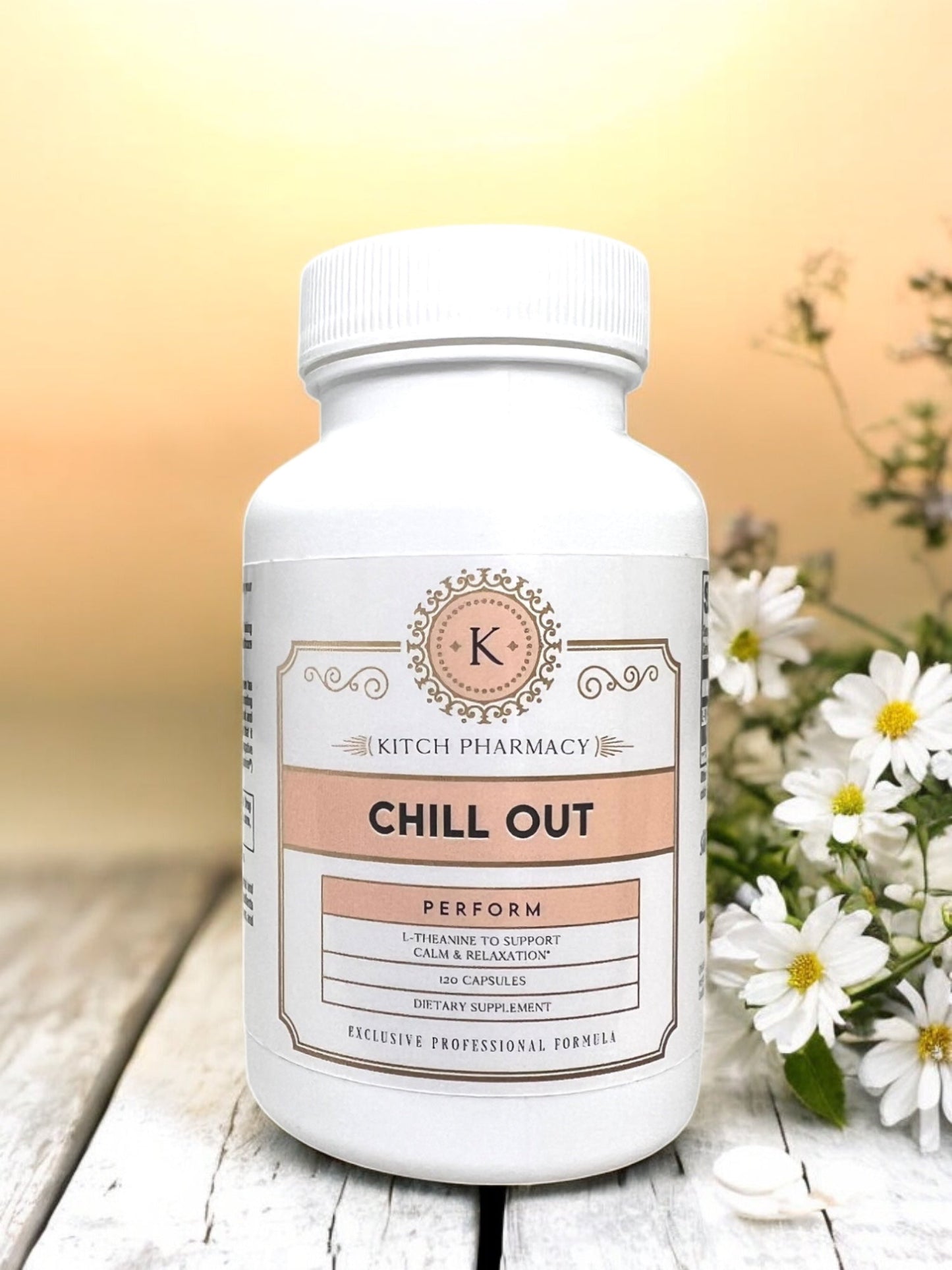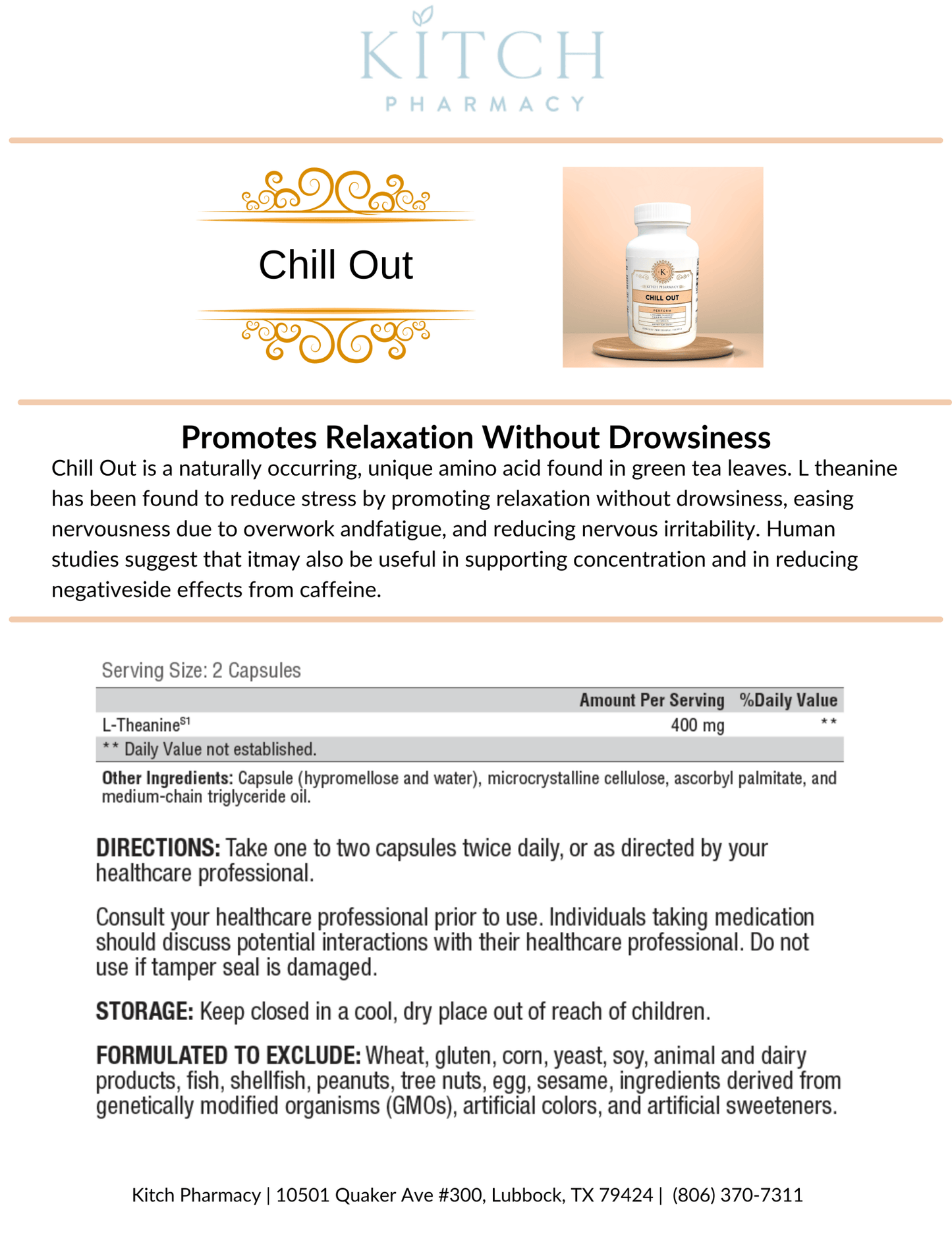Chill Out (Stress Relief & Relaxation)
Chill Out (Stress Relief & Relaxation)
Kitch Pharmacy
Couldn't load pickup availability
Share


Collapsible content
Product Details
Clinical Applications
- Promotes Relaxation Without Drowsiness
- Supports Nervous System Health and Function
- May Support Blood Pressure Already Within the Normal Range
- Supports Antioxidant and Detoxification Mechanisms
- May Support Liver Health and Function
Overview:
Chill Out is a naturally occurring, unique amino acid found in green tea leaves. L-theanine has been found to reduce stress by promoting relaxation without drowsiness, easing nervousness due to overwork and fatigue, and reducing nervous irritability. Human studies suggest that it may also be useful in supporting concentration and in reducing negative side effects from caffeine.
Green tea, prepared from the Camellia sinensis plant, has been consumed since ancient times for its calming influence. Modern research has looked into this “ancient wisdom” and revealed that L-theanine, an amino acid found almost exclusively in green tea, has specific and positive effects on the brain and nervous system, especially the promotion of relaxation without drowsiness.
Ingredient Information
Discussion:
Neurological and Brain Support
Human studies suggest that within 40 minutes of oral administration, L-theanine positively affected alpha waves in the brain, a phenomenon indicating relaxation. An 8-week, randomized, double-blind, placebo controlled study, based on the premise that L-theanine “possesses neuroprotective, mood-enhancing, and relaxation properties,” suggested that 400 mg of L-theanine per day was found to be safe and effective. A double-blind counterbalanced study suggested that oral L-theanine positively influenced heart rate and salivary IgA levels, attenuated sympathetic nervous system activation, and positively supported individuals’ normal response to stress. In examining L-theanine’s effect on cognition, a randomized, double-blind, placebo controlled study of 91 subjects suggested that individuals taking a combination of L-theanine and green tea extract experienced significant increases in theta waves in several areas of the brain, indicative of increased cognitive alertness. In cell studies, L-theanine appears to support neuronal health despite the presence of environmental toxins that ordinarily would increase the vulnerability of nigral dopaminergic neurons and negatively affect their function. L-theanine also appears to support neurological health by exerting a positive and significant impact on neurotrophic factors in the brain and assisting cell-signaling activity. Research into animal neurochemistry suggests that L-theanine positively supports overall nervous system health and activity due to its positive effects on serotonin, dopamine, and GABA levels, as well as its modulation of excitatory and inhibitory neurotransmission. L-theanine crosses the blood–brain barrier intact and may continue to balance neurochemistry by blocking glutamate transport, significantly reducing levels of extracellular glutamate and supporting the release of dopamine and glycine from neurons. Hepatic, Detoxification, and Cardiovascular Support Research studying ethanol metabolism and hepatic toxicity in animals suggests that administration of L-theanine increases liver alcohol dehydrogenase and aldehyde dehydrogenase activity, reducing blood ethanol concentration within 1 hour compared with controls. It is also suggested that L-theanine’s effect on cytochrome P450 2E1 activity, glutathione recovery, and antioxidant mechanisms supports healthy liver tissue and function. L-theanine was observed to significantly inhibit hydrogen peroxide–induced cell death, and it may play an important role in the maintenance of liver health. L-theanine, along with green tea polyphenols, was found to provide antioxidant activity that supports healthy LDL and oxidation levels and may subsequently support cardiovascular health. Animal and human studies suggest that L-theanine supports healthy blood pressure in the normal range, in part because it moderates the negative side effects of caffeine. Although theanine exists in both L- and D-forms, L-theanine is the preferred form because of its greater intestinal absorption and renal retention. An analysis of 6 commercial products revealed that 5 of them contained poorly absorbed D-theanine along with L-theanine. Only Suntheanine, the brand in Chill Out, contained exclusively the preferred L-theanine enantiomer. Suntheanine is multi-patent protected, including for its use in reducing anxiety and promoting relaxation. Chill Out provides 400 mg of Suntheanine L-theanine per 2-capsule dose.
*These statements have not been evaluated by the Food and Drug Administration.
This product is not intended to diagnose, treat, cure, or prevent any disease.


